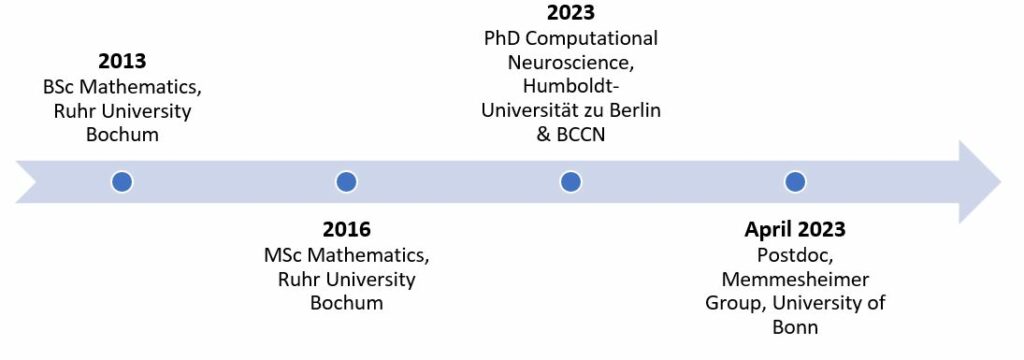Meet-the-Alumna │ Natalie Schieferstein A01 Postdoc
Name: Natalie Schieferstein
Currently at: University of Bonn
Position: Postdoctoral researcher
Graduated: January 2023
Degrees: MSc Mathematics, PhD Computational Neuroscience
Graduate studies: Computational Neuroscience
Career Timeline:

- Tell us about yourself. What do you currently do?
I just recently finished my PhD in Berlin and now moved to Bonn, where I am about to start a Postdoc position in the “Neural network dynamics and computation” group of Raoul Memmesheimer.
In my BSc/MSc I started out as a mathematics student. I soon became interested in the overlap between mathematics and neuroscience and decided to switch to Computational Neuroscience for my PhD. During my PhD in the Kempter lab I studied the dynamics of ripple oscillations in inhibitory network models, using numerical simulations and analytical mean-field approximations. Ripple oscillations are a hallmark of hippocampal network activity during slow wave sleep and are thought to play an important role in memory consolidation, which made them a fascinating research topic to me. In my postdoc I am now hoping to expand the theoretical tools at my disposal for studying the dynamics and function of neuronal networks. This may involve analyzing trained recurrent networks, or studying the drift of memory assemblies over time.
- How did your work in the lab of A01 help in your career after graduation? And involvement in the SFB1315?
Since I only graduated recently this question comes a little early, but what I can say for sure is that my PhD in Richard Kempter’s group was a crucial step for me to transition from the field of mathematics to neuroscience. During the PhD I acquired important tools and methods used in computational neuroscience, developed an understanding of the overall neuroscience landscape, and formed a particular interest in the numerical and analytical ways of understanding the dynamics of spiking neural networks – as well as the big question of how the brain forms and maintains memories. I greatly benefitted from the diverse neuroscience landscape in Berlin and the close interactions between theoretical and experimental labs, which were further deepened by the SFB. In our collaboration with the Schmitz lab I learned a lot about electrophsyiology and how to communicate effectively across disciplines. Thanks to a wide range of lecture series and retreat/workshop events, organized by SFB, BCCN and other Berlin institutions, I could meet many interesting people from different sides of neuroscience and regularly get inspiration on topics outside of my research focus.
- How did you conduct your job search after leaving A01?
Although I am aware of the many downsides and the inherent risk of the academic career path, I was very set on doing a postdoc, simply because I felt I had “just started” getting into neuroscience and there are so many interesting questions out there. So while finishing my PhD I started reading a little more “outside the box” of my PhD topic, putting together a list of potential groups and topics that I would be interested to pursue afterwards. In the end the decision came earlier than expected, when I got offered a position in one of those groups at the COSYNE conference. After visiting the lab and talking to the PI and students about their work and the lab life I decided to take the job.
- What advice would you give undergraduate students in neuroscience?
Neuroscience is a very wide field so I guess I would start by also reminding undergraduates in other disciplines (mathematics, physics, biology, psychology, computer science…) that they could consider getting into neuroscience! To me, the vast interdisciplinarity of neuroscience is both its most inspiring and daunting aspect. So I would recommend undergraduate or master students to not be discouraged by that and explore the many different subfields of neuroscience in order to (a) find the area they would like to specialize in eventually and (b) understand how their area of interest relates to the “bigger picture”.
From a practical perspective, learning a programming language such as python will certainly be helpful, as well as a solid basis in statistics. I know that many labs in Berlin take lab rotation students. Doing a lab rotation for a few months can be a great way of getting to know potential PhD supervisors and learning what neuroscientific projects can look like. Do not be afraid to reach out and talk to people in order to learn more about their projects. This doesn’t always have to be PIs – talking to current PhD students or postdocs may even be more informative, since they can probably relate better to your situation.
- How important do you think mentoring was and is for your career development, and would you be willing to mentor a student in our consortium?
I think I learned during my PhD that mentoring does not necessarily come in the form of a single person (“mentor”) who has all the answers. Instead I found it helpful to reach out to different people depending on the question at hand and I was lucky to receive ample support from my PI, additional supervisors, lab colleagues, and alumni during the PhD.
I would of course be happy to talk to students, feel free to reach out!
>>> To connect with Natalie, contact SFB Coordinator Marylu Grossman

